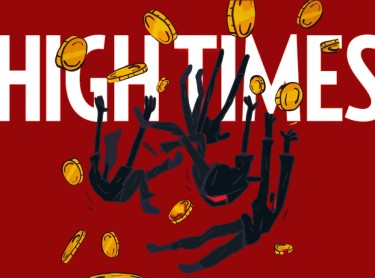
For the second time in less than two weeks, an iconic cannabis brand has gone belly up.
First the “Apple Store of Weed” Medmen delclared bankruptcy, and now legendary brand, High Times, has entered into bankruptcy proceedings. The legendary brands has been in a downward spiral since minor-league VC Adam Levin took over the show in December 2016. The ultimate cannabis bro, Levin lead High Times directly into the ground with hubris, arrogance, and by treating other cannabis businesses as second class citizens. From his farce hiring of Stormy Simon to be CEO, to his recent $600,000 payment to the SEC to settle securities fraud charges, High Times has been nothing short of a dismal disappoinment for those that grew up with the iconic magazine.
Brokers overseeing the asset sale of High Times, a financially strained marijuana brand and publication, are on the brink of finalizing a deal to offload its flagship West Hollywood store. On the other hand, Another bidder has submitted a six-figure offer for 420.com, one of the various assets offered for sale by Hightimes Holding Corp., the Los Angeles-based parent company of High Times, which entered receivership in April.
The initial offer for 420.com termed a “stalking-horse bid,” will establish a baseline for the valuation of this online asset, compelling other interested parties to surpass it with subsequent offers. Drew Mathews, CEO of Green Life Business Group based in San Diego, spearheads the liquidation proceedings of High Times, emphasizing his commitment to maximizing returns for the receivership.
While some in the industry feel Levin will use a “straw man bidder” to get the assets back at a much cheaper price and without the current debt loads, many feel the digital assets could get legitmate bids that go above and beyong the baseline asking price.
Some have argued corporate cannabis killed High Times and the stoner culture that it catered to. In the end, it was ownership and key employee arrogance that brought down the titan. High Times employees were notorious for threating other media outlets with lawsuits and legal action if they didn’t change certain stories or interviews to the way High Times deemed fit.
High Times holds a prominent stature within the cannabis industry, making this sale a significant event within the sector’s landscape. Mathews’ objective underscores the gravity of the transaction, ensuring that the process unfolds to the utmost advantage of all involved stakeholders.
Additional assets listed in Green Life’s marketing materials comprise:
-
Five operational or fully built-out California stores located in Blythe, Coalinga, Redding, San Bernardino, and Shasta Lake.
-
A comprehensive distribution, manufacturing, and delivery infrastructure situated in Lynwood.
-
A flourishing 10,000-square-foot cultivation enterprise based in Sacramento.
-
Valuable intellectual property encompassing renowned brands such as High Times magazine and its associated assets, the esteemed 420.com domain, Dope Magazine, the prestigious Cannabis Cup events, assorted social media accounts, and other related holdings.
Assets Could Yield More Than $11 Million
Drew Mathews, speaking to a media outlet on Tuesday, disclosed that the array of assets up for grabs could potentially yield over $11 million in proceeds. However, the opportunity to secure substantial offers is swiftly diminishing as the looming May 17 deadline approaches.
Mathews characterized the potential sale as one of the most significant ever conducted under receivership and emphasized the urgency of the situation. At its zenith, High Times boasted annual revenues exceeding $21 million, underscoring the substantial value inherent in its assets.
In addition to High Times’ holdings, the sell-off encompasses select assets from the California division of multistate firm Moxie. Hightimes Holding Corp., headquartered in Los Angeles, completed the acquisition of Moxie in November 2022.
As part of the transaction, Moxie, headquartered in Long Beach, received approximately 1.4 million shares of Hightimes voting common stock, as reported by MJBizDaily at the time. This convergence of assets further enriches the offerings available for acquisition, heightening the stakes for potential investors in this high-profile transaction.
Auction: A Viable Option
In the event that substantive offers fail to materialize, an auction will be convened, offering the assets to the highest bidders. However, it’s imperative to note that all asset sales must secure approval from the court, ensuring a transparent and legally sound process.
Kevin Singer, appointed as receiver for High Times in April, is responsible for overseeing these intricate proceedings. Singer’s experience extends to his recent role as receiver for the dissolution of the now-defunct California marijuana distributor Herbl. Court documents and industry insiders suggest that Herbl’s outstanding debt likely exceeded $10 million, providing Singer with invaluable expertise in navigating complex financial scenarios within the cannabis sector.
According to CRB Monitor, a reputable tracker of licenses in regulated industries, recent reports indicate that High Times has closed at least three of its branded marijuana stores in California. This development has left affected employees and vendors uncertain about their future engagements. However, Drew Mathews assures that stores in Blythe, Redding, and Shasta Lake remain operational, signaling a continued presence amidst the evolving landscape of High Times’ retail footprint.
An Alarming Trend
In the buzzing landscape of California, home to the world’s largest regulated marijuana market, the specter of unpaid invoices has loomed large for over a year. This issue exemplifies a broader trend seen in the cannabis industry, where retailers like Los Angeles-based MSO MedMen Enterprises have struggled to settle outstanding debts with brands, distributors, and former employees.
The saga surrounding High Times further underscores these financial challenges. The iconic brand was thrust into receivership following its failure to repay a staggering $28.8 million debt owed to lender ExWorks, which subsequently found itself in receivership, as detailed by the Green Market Report. In October, High Times’ parent company, led by board chair Adam Levin, faced significant repercussions, paying over $600,000 in fines to resolve securities fraud allegations.
Despite not admitting to any wrongdoing, Levin agreed to a three-year prohibition from holding officer or director positions as part of a settlement with the U.S. Securities and Exchange Commission (SEC). Hightimes Holding, established in 2017, was initially formed to acquire the rights to the legendary marijuana lifestyle magazine High Times and capitalize on its iconic brand equity in the burgeoning cannabis market.
Conclusion
The narrative surrounding High Times and the broader cannabis industry in California reflects the complexities and challenges inherent in navigating a rapidly evolving market. From the struggle to settle unpaid invoices to the legal ramifications stemming from financial mismanagement, the sector faces multifaceted issues that demand careful attention and strategic solutions.
The case of High Times poignantly reminds us of the importance of financial prudence and regulatory compliance in an industry marked by promise and peril. As stakeholders grapple with the fallout of unpaid debts, regulatory scrutiny, and corporate restructuring, the path forward necessitates a concerted effort to uphold transparency, accountability, and ethical conduct.
Despite the setbacks and uncertainties, the cannabis industry’s resilience endures, driven by innovation, consumer demand, and evolving regulatory frameworks. As High Times and other players navigate these turbulent waters, the lessons learned serve as valuable guideposts for shaping a more sustainable and responsible future for the cannabis market in California and beyond.
NOT JUST HIGH TIMES, BUT MEDMEN TOO, READ ON..
MEDMEN, THE APPLE STORE OF WEED, GOES UNDER, FINALLY…
- SEO Powered Content & PR Distribution. Get Amplified Today.
- PlatoData.Network Vertical Generative Ai. Empower Yourself. Access Here.
- PlatoAiStream. Web3 Intelligence. Knowledge Amplified. Access Here.
- PlatoESG. Carbon, CleanTech, Energy, Environment, Solar, Waste Management. Access Here.
- PlatoHealth. Biotech and Clinical Trials Intelligence. Access Here.
- Source: http://cannabis.net/blog/news/want-to-own-high-times-now-you-can-like-medmen-legendary-cannabis-brand-high-times-goes-bankrup




